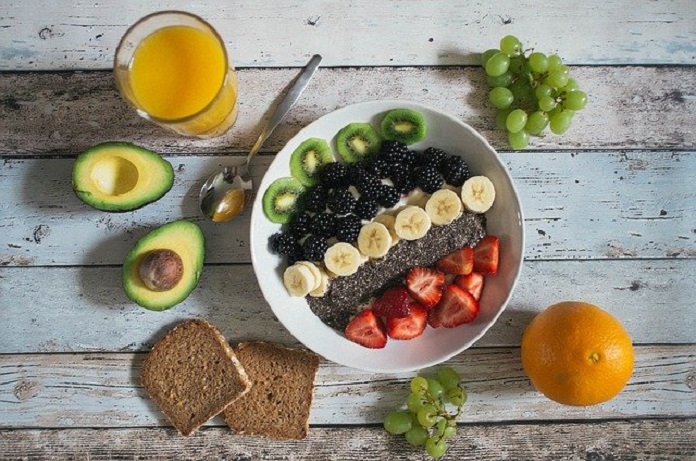High in protein and fiber
Starting your day with breakfast foods that are beneficial for a healthy gut is extremely important.
The gut is made up of small and large intestines, which are lined with millions of good bacteria. The gut microbiota appears to play a role in the development of obesity.
For this reason, analysis of the bacteria in our gut can predict obesity with an accuracy of 90%.
The bacteria in your gut vary depending on your diet and plays a vital role in digestion, immune function, and weight regulation.
Low bacterial diversity has been linked to diseases, including diabetes, inflammatory bowel disease, and celiac disease.
Nutrient-dense foods that are high in protein and fiber aid digestion, and provide the sustained energy necessary for healthy and efficient functioning of the digestive tract.
Protein for gut health
The best breakfast foods for gut health are nutritious, well-balanced, and filling.
Foods high in protein are helpful for reducing feelings of hunger and increasing the metabolic rate after eating and may also be beneficial for gut health, in comparison to carbohydrates and fats.
Although the amount of protein you require daily is dependent on your weight and lifestyle, the average person needs 46-56 grams of protein per day.
Greek yogurt is a good source of protein.
It is possible to increase the vitamin and mineral content of your breakfast by adding fruits or berries as a topping to Greek yogurt.
Some yogurts contain probiotics, which are live versions of good bacteria, such as lactic acid bacteria and bifidobacteria.
Eggs are highly versatile and a good source of protein, in addition to increasing feelings of fullness, and helping to maintain steady blood sugar levels. Three large eggs can provide 20 grams of high-quality protein.
Granola can be a filling breakfast that contains high-protein and high-fiber ingredients, including oats, nuts, and seeds.
These healthy ingredients have numerous benefits, such as improved gut health, blood pressure, cholesterol, and blood sugar, as well as reduced inflammation.
A protein shake or smoothie can be a high-protein breakfast choice that is satisfying, filling, and helps to stabilize blood sugar levels.
It is a good idea to add high-protein and high-fiber ingredients to smoothies, such as peanut butter, avocado, flax seeds, and vegetables.
Fiber for healthy digestion
A fiber-rich diet can help digestion and prevent constipation.
It is important to aim for the recommended dietary intake of 30 grams of fiber a day.
Low dietary fiber intake leads to reduced production of fatty acids and damaged mucosal barrier function in the digestive tract.
Fiber-rich foods include chia seeds, berries, and greens. Just 28 grams of chia seeds provide 11 grams of fiber per serving. Fruits have high fiber and water content, in addition to antioxidants that reduce the risk of diseases.
Overnight oats are high in both soluble and insoluble fiber, which can improve digestive health and bowel regularity.
Oats contain fiber in the form of beta-glucans, which have been associated with lowering cholesterol, regulating blood sugar levels, and creating a healthy gut environment.
Prebiotics for a healthy gut
In addition to probiotics, it is important to add prebiotics to your diet.
Prebiotics are complex carbohydrates that feed the microbes in your gut and can be acquired through foods such as vegetables, whole grains, asparagus, bananas, apples, flaxseeds, garlic, and onions.
Flaxseeds contain insoluble fiber, which can function as a natural laxative, and can be added to oatmeal, overnight oats, smoothies, yogurt, and cereal.
In addition to prebiotics, bananas also contain vitamins, minerals, antioxidants, and fiber.
Additional tips
Additional health benefits of good breakfast choices on gut health can be achieved by:
- Using skimmed or semi-skimmed milk rather than full-fat options
- Using caffeine to improve mood, alertness, mental performance, and metabolism but limiting its intake to one or two cups per day
- Drinking water and herbal teas as an alternative to coffee, tea, and fizzy drinks
- Avoiding highly processed foods
- Increasing the amount of plant-based foods you consume to prevent digestive problems
- Choosing extra-virgin olive oil rather than other fats as it contains high numbers of micronutrients (polyphenols)
- Reducing the intake of sugar and artificial sweeteners to prevent an imbalance of gut microbes
References
What should I eat for a healthy gut? (2020). BBC Food. Retrieved from: https://www.bbc.co.uk/food/articles/what_should_you_eat_for_a_healthy_gut
Valdes, A.M., et al. (2018). Role of the gut microbiota in nutrition and health. BMJ, 361.



